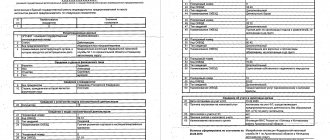Accounting for transactions related to judicial appeals for consideration of a claim
Consideration of claims in court is accompanied by a state fee payable upon filing the application. After consideration of the controversial issue, the amount of the fee as part of legal costs is compensated by the losing party in full or in part. Repayment of costs is carried out by court decision.
Example of registration of state duty by the plaintiff
The Vector organization filed a lawsuit against the Micron organization. The amount of state duty for a business claim within the framework of non-core activities amounted to 12,500 rubles. After considering the case materials, the court ruled in favor of the plaintiff with the defendant paying him the amount of the claim and legal costs, including state fees. The following entries are made in the accounting of the Vector organization:
- The transfer of the amount to the judicial authority is reflected: Dt 68 Kt 51 in the amount of 12,500 rubles;
- The amount of the duty is taken into account as part of the expenses: Dt 91/2 Kt 68 in the amount of 12,500 rubles;
- Income is reflected in the form of a compensated duty: Dt 76/2 Kt 91/1 in the amount of 12,500 rubles;
- The amount transferred by the Micron organization was taken into account: Dt 51 Kt 76/2 in the amount of 12,500 rubles.
The amount of state duty is taken into account on the basis of a copy of the ruling on acceptance of the claim for processing. Costs compensated by the defendant are taken into account as other income based on a court decision. In tax accounting, amounts are taken into account in the form of non-operating expenses and income.
Legal expenses in the form of state fees
The amount of state fees for each type of appeal is established by Ch. 25.3 Tax Code of the Russian Federation. State duty is a fee collected when filing a claim in court. The original payer is the plaintiff. The final payer of the amount is the losing party, who is awarded costs.
The fee amount is set depending on the characteristics:
- Type of claim – economic, non-property, administrative.
- Categories of appeal – statement of claim, appeal or cassation complaint.
- The level of the judicial body - arbitration, general jurisdiction, higher body.
The most common cases are those of a commercial nature. The amount of the fee depends on the value of the assessed claim. For applications from persons without specifying the price of the claim, a fixed fee is provided.
Payment is made before filing an application with the court using the details provided by the authority. If the amount increases during the meeting, an additional payment is made. The legislation establishes a list of persons exempt from payment or who have the opportunity to reduce the amount of payment. When filing a claim, persons belonging to the preferential category confirm their right with documents.
| ★ Best-selling book “Accounting from scratch” for dummies (understand how to do accounting in 72 hours) > 8,000 books purchased |
Differences between transactions for payment of state duty by the defendant and the debtor
The consideration of disputes in court is formalized by a decision or order. The procedure for conducting judicial procedures and paying fees when making a decision or order differs.
| Condition | Procedure for making a court decision | Procedure for issuing a court order |
| Consideration of the case | In proceedings involving the parties | By reviewing the case materials by the judge |
| Possibility of cancellation | Not provided | Provided |
| The party against whom the claim is made | Defendant | Debtor |
| Issues covered | Controversial order | Undisputed order or recognized by the debtor |
| The amount of the fee paid by the plaintiff for property appeals | 100% of the duty established by clause 1 of Art. 333.19 Tax Code of the Russian Federation | 50% of the duty established by paragraph 1 of Art. 333.19 Tax Code of the Russian Federation |
A plaintiff who is denied consideration of a simplified form of proceedings with the issuance of a court order may return the amount of the fee or offset it when applying to the court to consider the case with the participation of the defendant.
Calculation of state duty for postings in 1C 8.3
First, let's figure out what account to assign the state duty to in 1C 8.3.
Accounting for state duties in accounting
In BU the duty paid for the purchase of a car:
- before registration as fixed assets, they are included in the initial cost and taken into account according to Dt 08.04.1 (chart of accounts 1C, clause 8 of PBU 6/01);
- after - to other expenses (according to Dt 91.02) or expenses for ordinary activities (according to Dt 20, 26, etc.), depending on the activity in which they plan to use the OS (clauses 5, 11 of PBU 10/99) .
Accounting for state duty in tax accounting
In NU the duty is taken into account:
- In the original cost of the fixed assets, if the duty was paid before commissioning (Letter of the Ministry of Finance of the Russian Federation dated 06/08/2012 N 03-03-06/1/295, clause 1 of Article 257 of the Tax Code of the Russian Federation);
- In other (indirect) expenses, if the state duty was paid later (Letter of the Ministry of Finance of the Russian Federation dated July 24, 2018 N 03-03-06/3/51800, clause 1 of Article 264 of the Tax Code of the Russian Federation). In this case, the amount of the duty is recognized as a lump sum in expenses on the date of its accrual (clause 1, clause 7, article 272 of the Tax Code of the Russian Federation).
Study this issue in more detail, based on a comprehensive analysis of current regulations and taking into account the latest legislative trends
Accounting for state duty in 1C
Accounting for state duty costs is reflected in the document Transaction entered manually, the transaction type Transaction through the section Operations - Accounting - Transactions entered manually.
If the management plans to operate the vehicle on public roads, then it must be registered with the State Traffic Safety Inspectorate before registration as an OS and before the start of operation, since without state registration it will not be possible to operate the vehicle for these purposes. Therefore, in our example, we will include the state duty in the initial cost in both NU and BU.
In the form we indicate:
- Debit - 08.04.1, accounting account where the initial cost of the fixed assets is formed;
- Col. — in quantitative accounting, 1 piece of non-current asset has already been accepted into the account 08.04.1, therefore it is not filled in;
- Credit - 10 “Other taxes and fees”;
- Amount - the amount of duty paid;
- The amount of NU Dt is the amount of the duty paid.
Test yourself! Take the test:
- Test No. 36. Payment order for payment of the state duty for registering a car with the traffic police
- Test No. 34. Accounting for the fee for state registration of a car
- Test No. 47. Accounting for MTPL insurance premiums
- Test No. 5. Accounting for CASCO insurance premium
See also:
- A new list of expensive cars has been announced
- Acceptance of OS accounting in 1C 8.3
- Transport tax in 1C 8.3
- How to capitalize fixed assets in 1C 8.3: step-by-step instructions
If you are a subscriber to the BukhExpert8: Rubricator 1C Accounting system, then read additional material on the topic:
- Payment order for payment of the state fee for registering a car with the traffic police
- Accounting for the fee for state registration of a car
- State duty for registering a car in accounting and tax accounting: legislation
- What taxes should be reflected on page 041 of Appendix No. 2 to Sheet 02 in the income tax return?
If you haven't subscribed yet:
Activate demo access for free →
or
Subscribe to Rubricator →
After subscribing, you will have access to all materials on 1C Accounting, recordings of supporting broadcasts, and you will be able to ask any questions about 1C.
Did the article help?
Get another secret bonus and full access to the BukhExpert8 help system for 14 days free of charge
Fee for obtaining an extract from the Unified State Register of Legal Entities
An extract from the Unified State Register of Legal Entities contains basic information about the registered enterprise. The document is used to present to partners when concluding large contracts, to banks when lending, and to counterparties if necessary to confirm constituent information. Order an extract from the registration authority of the enterprise have the right to receive personal data or any other enterprise in the register.
The amount contributed to the budget depends on the urgency of the order. The fee is 200 rubles if information is received within 5 days and 400 rubles if the document is prepared within 24 hours. The fee for providing information from the Unified State Register of Legal Entities is not a state duty.
Example of transactions when receiving an extract from the Unified State Register of Legal Entities
The trading organization "Crocus" submitted an application to the Federal Tax Service to receive an extract from the Unified State Register of Legal Entities. The application was submitted for the issuance of the document on an urgent basis. In the accounting of the enterprise the following entries are made:
- The payment to the budget is reflected: Dt 76/5 Kt 51 in the amount of 400 rubles;
- The fee is included in expenses after receiving the statement: Dt 44 Kt 76/5 in the amount of 400 rubles.
The costs of obtaining an extract are economically justified.
Payment of state duty: postings in 1C 8.3
Payment of state duty
Fill out the payment order for payment of the state duty with the document Payment order transaction type Payment of tax through the section Bank and cash desk - Bank - Payment orders.
Please indicate in the form:
- Tax - State Duty... from the Taxes and Fees directory. If you are paying for the first time, create it manually.
- Type of liability - Tax.
In the recipient's details, indicate the traffic police department where the car is registered.
BukhExpert8 advises that before paying the state duty, check the recipient’s details on the official website of the State Traffic Inspectorate.
Check the Payment Details link for the established KBK and other data:
- KBK - 18810807141011000110 “State duty for state registration of vehicles...”.
Read more about issuing a payment order for payment of state duty
Postings for payment of state duty
Register confirmation of payment of the state duty with the document Write-off from the current account transaction type Payment of tax through the section Bank and cash desk - Bank - Bank statements - Write-off.
Please indicate:
- Date - the day the fee is transferred according to the bank statement;
- Tax - State Duty... from the Taxes and Fees directory;
- According to document No. from - date and number of the payment order;
- Type of liability - Tax;
- Recipient - the government agency to which the duty is paid, Type of counterparty - Government agency, selected from the Counterparties directory;
- Reflection in accounting: Types of payments to the budget - Tax (contributions): accrued / paid;
- Debit account - 68.10 “Other taxes and fees”;
- Budget levels - Federal budget.
Postings
Wiring is generated:
- Dt 68.10 Kt 51 - payment of state duty for registering a car with the traffic police.
Accounting for state fees when registering and amending constituent documents
The state duty is paid to the budget upon registration of a legal entity or individual entrepreneur. The payment receipt is included in the package of documents submitted to the registration authority. The payers of the state duty are the founders or the entrepreneur. If errors are identified in the documents, the amount is paid upon each resubmission.
Enterprises must promptly notify the Federal Tax Service of changes made in order to make adjustments to the register. Changes can be made to the constituent documents, of which the Federal Tax Service is informed by submitting an application P13001 with payment of the state duty. If changes occur that do not affect the constituent documents, filing an application P14001 is not accompanied by payment of a fee.
How to reflect state duty in accounting
The method of reflecting the amount of state duty on accounting accounts depends on the type of government service for which the payment is made. Payment of a fee may be required, for example, in the following cases:
- registration of rights to property assets;
- registration of transactions within the main areas of the company’s work;
- amendments to constituent documents;
- participation of a business entity in litigation.
When state duty is calculated, accounting entries are made using account 68. For separate accounting, subaccount 68/State duty is entered into the working chart of accounts. It is credited when fees are calculated, and debited when obligations to the budget are repaid.
When reflecting the duty, payment of which is necessary in connection with the acquisition of a property asset, the following entry is created in accounting:
- D08 – K68 / State duty. The correspondence includes the entire amount of duties paid to the state in the initial cost of the purchased object.
Fees that are paid in connection with activities that do not directly affect the main segment of the enterprise are taken into account as follows:
- court fees are shown as other expenses on account 91 (in debit);
- making adjustments to the statutory or registration documents is reflected through correspondence with the debit of account 26 or 44.
Accounting for state duties when purchasing and leasing property, purchasing a vehicle
The acquisition of real estate and vehicles obliges businesses to register ownership of the property. As part of the package of documents for registration, a payment document confirming payment of the fee is submitted. The transfer of the fee to the budget is carried out by the buyer. The amount is included in the cost of acquiring the property and increases the initial cost of the property or vehicle.
| Purpose of the operation | Account debit | Account credit |
| Transfer of state duty to the budget | 68 | 51 |
| Accounting for the fee as part of the costs of acquiring property | 08 | 68 |
| Formation of the cost of fixed assets | 01 | 08 |
Registration of a property lease agreement is carried out if the annual term of the agreement is exceeded. If the terms of the lease are changed, the additional agreement must also be registered in the register. The state duty paid upon registration of the lease agreement is credited to the expense accounts for the conduct of ordinary activities of the enterprise. The fee amount is written off during the term of the lease agreement in equal installments.
Answer
In accounting, the accrual and payment of state duty is reflected in account 68 subaccount “State duty”.
Reflect the payment of the state duty by posting:
Debit 68 subaccount “State duty” Credit 51
- state duty has been paid.
The procedure for reflecting state duty on cost accounts depends on the reasons for which it was paid.
If the organization paid a state fee when purchasing or creating property, before putting it into operation, include it in the actual cost of such property and reflect it in the posting:
Debit 08 (10, 41.) Credit 68 subaccount “State duty”
– state duty associated with the acquisition (creation) of property has been assessed.
If an organization pays a fee in the course of its current activities, when calculating the state duty, make the following entry:
Debit 20 (26, 25, 44.) Credit 68 subaccount “State duty”
– state duty has been charged on transactions related to the main activities of the organization.
If an organization pays state duty on transactions that are not related to its main activity, include the amount of the fee as part of other expenses and reflect it by posting:
Debit 91-2 Credit 68 subaccount “State duty”
– state duty has been charged on transactions not related to the main activities of the organization.
If the organization transferred the state fee for consideration of the case in court, include the amounts paid in other expenses and make an entry:
Debit 91-2 Credit 68 subaccount “State duty”
– a state fee has been charged for the consideration of the case in court.
The detailed procedure for reflecting state duty in accounting is given in the extended answer.
If an organization pays a single tax on the difference between income and expenses, then the amount of state duty paid can be taken into account in expenses at the time of payment to the budget. At the same time, as an expense, the state duty must be economically justified.
The rationale for this position is given below in the recommendations of the Glavbukh System.
1. Recommendation: How to reflect the state duty in accounting
The state duty is a federal fee and represents a payment for the commission of certain legally significant actions by authorized government bodies (officials) (Article 13. 333.16 of the Tax Code of the Russian Federation).
Recognition of expenses
Recognize the costs of paying the state duty in the reporting period in which these actions were performed (clause 18 of PBU 10/99).* The duration of the period during which the organization will use their results does not matter. For example, if an organization pays a state fee for issuing a license to conduct a certain type of activity, then, regardless of the validity period of the license, the costs of paying the state fee in accounting should be recognized in the period when the license was issued.
In accounting, take into account the accrual and payment of state duties on account 68 “Calculations for taxes and fees.” To do this, open a “State Duty” subaccount for account 68.*
Reflect the payment of the state duty by posting:*
Debit 68 subaccount “State duty” Credit 51
- state duty has been paid.
The procedure for reflecting state duty on cost accounts depends on the reasons for which it was paid. Payment of state duty may be subject to:*
- acquisition (creation) of certain types of property or rights;
- operations that are carried out as part of the main activities of the organization;
- operations not related to the main activity;
- consideration of the case in court.
If the organization paid a state duty when purchasing or creating property, include it in the actual cost of such property* (clause 6 PBU 5/01. clause 24 of the order of the Ministry of Finance of Russia dated October 13, 2003 No. 91n. clause 8 PBU 6/01. clause 8 of PBU 14/2007). For example, if a state duty is charged for certification of goods, for registration of rights to real estate (before their commissioning), etc.
Fees charged by notary offices
Services provided by public and private notaries are equivalent in legal force. Payments by enterprises to private notaries are not a state duty. When performing notarial acts the following fees are charged:
- State duty when an enterprise applies to a state office;
- Service fee (tariff), equal to the state duty, when applying to private notaries;
- Notary fee when receiving a service that is not a mandatory legislative action. An enterprise can contact a notary for advice, certification of a copy of a document, and drawing up a draft agreement.
Accounting for enterprise expenses in accounts and recording correspondence depend on the type of expenses incurred. The basis for recognizing expenses is a certificate from a notary office detailing the type of service received.
| Purpose of the operation | Account debit | Account credit |
| Payment of a fee to a public notary for performing actions required by mandatory legislative certification | 68 | 71 |
| Accounting for state duty expenses as part of expenses | 20, 44, 26, 91 | 68 |
| Payment of the notary fee to a private notary or a person appointed by the state when performing actions that do not require mandatory certification | 76 | 71 |
| Accounting for fees as part of costs | 20, 44, 26, 91 | 76 |
Expenses made through an accountable person are taken into account on the day the manager approves the advance report.
Accounting Rules
Based on Order of the Ministry of Finance No. 94n, take into account the payment of state duties in the active-passive accounting account 68 “Calculations for taxes and fees.” However, this account should accumulate calculations for all types of tax deductions of a business entity, with the exception of insurance premiums.
To provide detailed information, provide a separate sub-account to reflect information on payment of state duty. Typically, the state duty is recorded in which account: this is accounting account 68.10 - “Other taxes and fees.”
When calculating state fees, reflect the turnover on the account credit. When paying, record the transaction using a debit transaction. Now let’s determine which accounting accounts to use when compiling correspondence.
Accounting for state duties: accounting in organizations financed from the budget
Budgetary organizations, along with commercial enterprises, pay state duties when they carry out legally significant actions. Payment is made from budgetary funds or extrabudgetary revenues. The state duty can be paid when purchasing property, going to court, or conducting extra-budgetary activities.
To account for state duties, account 0.303.05.000 of the budget chart of accounts is used. Similar to commercial accounting, when purchasing property, the amount is included as part of the acquired object; when using duties in current activities (for example, when licensing) - as part of expenses. When returning duties or compensating expenses, the amounts go to budget revenue.
Accounting for state duties
Issues related to state duty are regulated by Chapter. 25.3 Tax Code of the Russian Federation. According to Art. 333.16 of the Tax Code of the Russian Federation, state duty is defined as a fee required to be paid by individuals or legal entities when they apply to government agencies to perform legally significant actions. Our article is devoted to the formation of entries for state duties in accounting and tax accounting, so we will only talk about state duties paid by organizations.
There can be many of them. Starting with the fact that the company must pay a fee upon registration. However, the state fee for registering an organization (by the way, like an individual entrepreneur) cannot be taken into account as expenses in accounting or tax accounting, since such expenses are borne by the person paying it, and not by a legal entity or individual entrepreneur, which does not yet exist at the time of transfer of funds.
Payment of state duty may be required in situations where it is necessary:
- make changes to the constituent documents of the company;
- perform some actions with the license (receive for the first time or a duplicate, re-issue);
- file a lawsuit;
- perform registration actions in connection with the acquisition of the OS and others.
Such state duties can be taken into account in the accounting and tax accounts of the organization.
Accounting for state duty in tax accounting
The amounts of fees are included in the expenses of the enterprise and are used in taxation. Features of accounting for amounts:
- The duty is taken into account as part of other expenses (Article 264 of the Tax Code of the Russian Federation);
- When using the accrual method, amounts are recorded as a lump sum when the right arises;
- When using the cash method, amounts are written off after payment to the budget.
- The defendant's legal costs, compensated by a court decision, are not a state duty and are included in non-operating expenses;
- The costs of state fees and other notary services are taken into account as part of other expenses under the OSNO and the simplified tax system. Amounts are taken into account within the established tariffs. Costs in excess of tariffs under OSNO can be accepted as expenses with additional confirmation of economic justification and in the simplified tax system if they are of a legal nature;
- The fee paid upon registration of real estate is included in the cost of the property as the amount necessary to bring the property to working condition.
When determining the state duty as part of tax expenses, the amount of the fee must be determined, used to obtain economic benefits and paid in accordance with the requirements of legal norms
State duty: accounting entries
reflect it with wiring:*
Debit 08 (10, 41.) Credit 68 subaccount “State duty”
– state duty associated with the acquisition (creation) of property has been assessed.
If an organization pays a fee in
in the course of current activities (certifies documents, makes copies of them, registers contracts, etc.), when calculating the state duty, make an entry:*
Debit 20 (26, 25, 44.) Credit 68 subaccount “State duty”
– state duty has been charged on transactions related to the main activities of the organization.
If an organization pays state duty on transactions that are not related to its main activity, include the amount of the fee as part of other expenses (clause 11 of PBU 10/99). For example, when alienating property under an exchange agreement (paragraph 5, clause 11 of PBU 10/99). In accounting, reflect the operation for calculating state duty by posting:*
Debit 91-2 Credit 68 subaccount “State duty”
– state duty has been charged on transactions not related to the main activities of the organization.
State fee for consideration of cases in court
If the organization transferred the state fee for the consideration of the case in court, include the amounts paid in other expenses (account 91) (clause 11 of PBU 10/99). When going to court, make the following entry:*
Debit 91-2 Credit 68 subaccount “State duty”
– a state fee has been charged for the consideration of the case in court.
According to procedural legislation, if the plaintiff wins the case, the court will recover from the defendant legal costs (including state fees) in his favor (Article 110 of the Arbitration Procedure Code of the Russian Federation, Article 98 of the Code of Civil Procedure of the Russian Federation).
The defendant organization reflects such an operation with the following entries:
Debit 91-2 Credit 76
– legal costs (including state fees) subject to compensation to the plaintiff by court decision are reflected;
Debit 76 Credit 51
– the amount of compensation for legal costs (including state fees) was transferred to the plaintiff according to the court decision.
The plaintiff organization reflects this transaction with the following entries:
Debit 76 Credit 91-1
Debit 51 Credit 76
– reimbursement of legal costs (including state fees) according to a court decision has been credited to the bank account.
Refund of state duty from the budget
If organizations return from the budget a state fee that was previously included in expenses, then recognize the amount due as part of other income.* This must be done on the date of the decision to return the fee (clause 7 of PBU 9/99). The decision to return is made by the body carrying out the actions for which the state duty was paid (when considering cases in courts - the tax office, in which the court considering the case is registered) (clause 3 of Article 333.40 of the Tax Code of the Russian Federation). When reimbursing state fees from the budget, make the following entries:*
Debit 68 subaccount “State duty” Credit 91-1
– reflects the budget debt for the return of state duty;
Debit 51 Credit 68 subaccount “State duty”
– the amount of previously paid state duty was returned from the budget.
Sergey Razgulin . valid
State Councilor of the Russian Federation, 3rd class
2. Recommendation: How to take into account state duty when taxing
If an organization pays a single tax on the difference between income and expenses, then the amount of state duty paid can be taken into account in expenses (subclause 22. 31 clause 1 of article 346.16 of the Tax Code of the Russian Federation). Moreover, as an expense, the state duty must comply with the criteria of paragraph 1 of Article 252 of the Tax Code of the Russian Federation. That is, it must be economically justified. The same rule applies to the amount of reimbursement of legal costs by the defendant (subclause 31, clause 1, article 346.16 of the Tax Code of the Russian Federation).
Include the amount of the state duty in expenses at the time of its payment to the budget (transfers to the plaintiff’s account as reimbursement of legal costs)* (Clause 2 of Article 346.17 of the Tax Code of the Russian Federation).
If, according to a court decision, the costs of the state duty of the plaintiff organization are reimbursed by the defendant, take into account the amounts received in non-operating income (clause 1 of Article 346.15 of the Tax Code of the Russian Federation). The same rule applies to the return of state duties from the budget. This conclusion can be drawn by paragraph 3 of Article 250 and paragraph 1 of Article 346.15 of the Tax Code of the Russian Federation.
Sergey Razgulin . valid
State Councilor of the Russian Federation, 3rd class
* This is how part of the material is highlighted that will help you make the right decision.
Have a question? Our experts will help you within 24 hours! Get answer New
https://youtu.be/JnfoUqFat8A
Category: Taxes
State duty in 1C 8.3: postings for accrual and payment
Organizations often turn to institutions for legal and other services. For example, regarding the state registration of a new company or to certify contracts. For such services, enterprises pay a fee to the budget. How to make postings for state duty in 1C 8.3, read this manual.
"BUCHSOFT" REPORTING VIA THE INTERNET Test and send reports to funds and inspections online! Fast connection. If you find it cheaper, we'll give you your money back!
State duty is a type of tax. The calculation of duties in accounting is similar to tax calculation operations. In program 1C 8.3, state duty is taken into account in account 68.10 “Other taxes and fees”. If the duty increases the cost of property, then we recommend taking it into account in 1C 8.3 on account 76.09 “Other settlements with various debtors and creditors.” The accrual of state duty is reflected by:
- On the debit of account 91.02 “Other expenses”. In cases of payment of fees for consideration of legal claims;
- In the debit of account 08 “Investments in non-current assets”. When paying state duty in connection with the acquisition of property (if payment occurred before it was accepted for registration);
- By debit of accounts 20, 25, 26, 44. In cases of payment of fees for legal actions related to the main activities of the enterprise: registration of business contracts, notarization of statutory documents or translations, issuance of licenses.
Payment of duties to the budget is reflected in the debit of accounts 68.10 or 76.09 and the credit of account 51 “Current account”. In 1C 8.3, a document “Write-off from current account” is created for this purpose.
Calculation of state duty in 1C 8.3 can be done in two ways:
- Manually;
- Using a standard operation.
Manual posting involves manually entering offsetting accounts, analytics, and amounts. A typical posting is entering an amount into a ready-made posting template. The second method is faster, but for this you need to create a standard operation.
In our article we will talk about creating state duty transactions in 1C 8.3 in two ways.
Full text of instructionsDownload >Quick transfer of accounting to BukhSoft
Features when reflecting payment of state duty ↑
The first amount of state duty paid is the fee collected upon registration of a legal entity. The contribution of funds is made by the founders of the enterprise.
The duty does not apply to the organization’s expenses and is not taken into account when taxing profits or the single tax.
The fee paid upon subsequent amendments to the constituent documents is written off as part of the organization’s expenses. The inclusion of state duty in the property subject to registration has a number of features.
Until 2011, the duty was paid before state registration and formation of the OS after receiving the certificate.
Starting from 2011, the formation of value and registration of fixed assets must be carried out from the moment of signing the acceptance certificate until state registration.
If there is no fact of payment of the duty at the time of registration, its inclusion in the fixed asset is made by charging a fee on account 96 “Reserves for future expenses.”
The formation of reserve amounts is carried out on the basis of an accounting certificate drawn up by an accounting employee. The document is drawn up in any form describing the appointment, date, executor and has legal force.
The overpaid amount of state duty is accumulated in the taxpayer’s personal account. Its return is made on request. In some cases, it is necessary to have a decision from the authorities in respect of which the payment was made.
Refunds are made only within the limitation period. Amounts not claimed in a timely manner are included in the losses of previous years.
When working with 1C
Registration of accounting transactions is carried out with the participation of accompanying programs. In 1C, the payment of state duty is written off by posting an extract from the “bank” bookmark using the “tax transfer” operation.
Further write-off is determined by the accountant, who determines the expense write-off account - 20, 44, 91, 08.
Journal entries
Entry into the journal of transactions is formed on the basis of an accountant's certificate. The posting is generated manually using the “operations” tab.
What is the state duty for technical inspection in 2020, see here.
Read all about the state duty for obtaining an extract from the Unified State Register of Legal Entities here.
For companies using the simplified tax system, expenses are generated on the basis of a bank statement. Entering an entry into the CD&R is done by manually entering and using a button with the same name.
Postings in a budget organization
The chart of accounts in budget accounting differs from the commercial form. The principle of constructing entries is similar to those adopted for accounting for business activities.
For budget accounting, the following operations are generated:
buhonline24.ru









